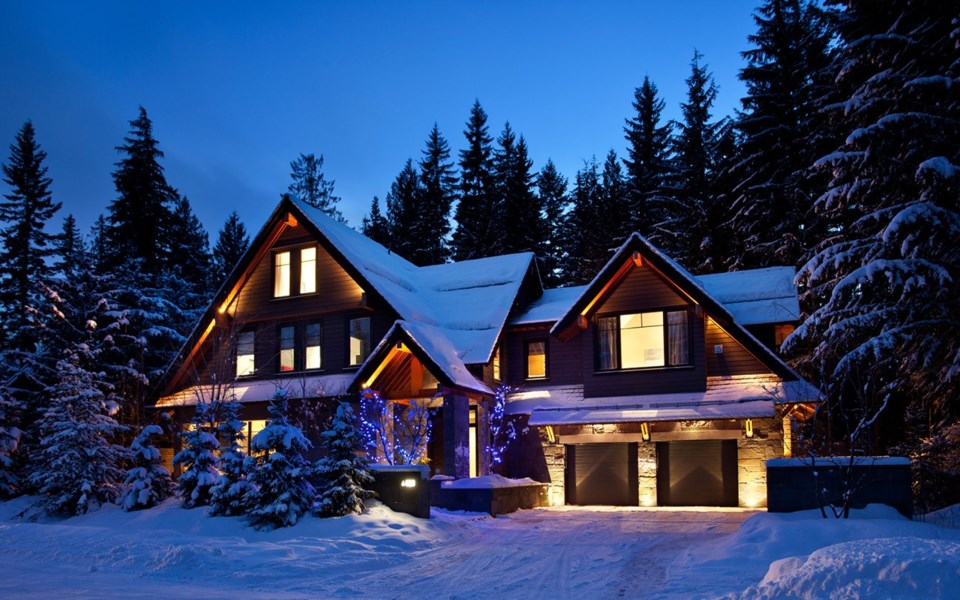Property assessments in Whistler continued to rise in 2017.
According to BC Assessment, local property values rose 21 per cent overall between July 1 2016 and July 1 2017 — the third straight year of double digit increases.
The jump comes after a 20-per-cent increase over the same period last year and an 11.71-per cent bump in 2015.
"I'd say it's stable, but a positive market (in Whistler)," said Paul Borgo, acting assessor for the Greater Vancouver region, which includes Whistler.
Assessed values are determined by looking at sales and market activity at July 1 each year, Borgo said.
"It's really the buyers and sellers and their perception of the strength of the market... we follow that in our assessments by reflecting those sales," he said.
The biggest change for Whistler was a 30-per-cent increase in village strata townhouses (from $673,000 to $877,000), followed by a 24-per-cent jump in Blackcomb Benchland strata townhouses ($896,000 to $1,114,000).
Single-family homes in Alpine increased 23 per cent, from $1,388,000 to $1,701,000, while single-family homes in the Creekside area went up just eight per cent, from $1,587,000 to $1,711,000.
Overall, Whistler's assessed roll for residential properties increased from $13.1 billion in 2017 to $15.9 billion in 2018.
In terms of commercial properties in Whistler, Borgo said the majority will increase in assessed value in the 5-to-20 per-cent-range, though some stratified commercial properties will exceed that.
The increases may come as a surprise to some homeowners, said Pat Kelly of the Whistler Real Estate Company, but overall he can't disagree with the numbers.
"As always, in a small marketplace, there's going to be some properties that haven't sold for a number of years, and so they don't have any comparables, but overall, the general increase in Whistler from July 1 to July 1 is in the order of 25, 26 per cent on average," Kelly said.
"People need to keep in mind that it isn't really the assessment that determines what their taxes are. It's the mill rate and the municipal budget, and as long as your increase isn't more than the average for the area, then you shouldn't end up with a surprise, really."
Whistlerites will get their first look at the 2018 municipal budget at an open house in late February.
Anyone who thinks their assessment isn't accurate has until January 31 to file an appeal.
"If you have logic, they will listen to you, and it doesn't have to be difficult," said Ann Chiasson, of Re/Max Sea to Sky.
"But if you live in a brand new house that's 5,000 square feet and the neighbour next door sold for $5 million, you're going to have a tough time convincing them that your house is worth less."
Going through the appeal process is worth it for people in transitioning neighbourhoods, Chiasson said.
"It's knowing your house and knowing the neighbour's house, and being able to compare them in that respect," she said.
Homeowners can view and compare their assessment online at www.bcassessment.ca.
While there are a lot of factors that come into play when people are buying homes, with three consecutive years of double digit growth, it's likely things will level off soon.
"I would expect that the velocity of activity will continue to go back to normal levels from the peak of last year, which was like 1,200 units in Whistler — this year it's like 800, 850," Kelly said.
"So the volume of activity is down, and generally speaking, price follows volume. And basic economics suggest that as demand drops, prices tend to modify, so I think the rate of appreciation will probably slow down."
In Squamish, increases ranged from eight per cent for a single-family home in the Garibaldi Highlands (from $892,000 to $962,000) to 20 per cent for a Garibaldi Estates Townhouse ($496,000 to $596,000).
In terms of Pemberton, Borgo said: "I understand that it's a similar market to Squamish and Whistler — similar trend, similar movement. I don't have a specific example there."
Overall, the Greater Vancouver region's total assessments increased from $825.2 billion to $907.1 billion.
Residential, single-detached homes ranged from changes of -5 per cent to +25 per cent; residential strata units from 5 to 35 per cent; commercial properties from -5 to +50 per cent; and light industrial from 0 to 45 per cent.




